
Latest News Regarding
Horn of Africa
Will China Resolve Conflict over the Grand Ethiopian Renaissance Dam?
Will China Resolve Conflict over the Grand Ethiopian Renaissance Dam?
Source: Al-Monitor published on 21 January 2022 an article titled “China Appoints Envoy for Horn of Africa” by Ayah Aman.
Since the announcement in early January by Chinese Foreign Minister Wang Yi that China will appoint a special envoy for the Horn of Africa, there has been considerable speculation about China’s future role in the region. This article concludes that China will continue to pursue a neutral policy on the Grand Ethiopian Renaissance Dam in order to preserve Beijing’s strategic interests in the region.
Labels: Africa, AU, China, Egypt, Eritrea, Ethiopia, GERD, Horn of Africa, Sudan, Tigray Region, Wang Yi
US Continues Withholding Aid to Sudan
US Continues Withholding Aid to Sudan
Source: The Associated Press published on 20 January 2022 an article titled “US Says It Will Not Resume Sudan Aid after Recent Violence.”
US Special Envoy for the Horn of Africa, David Satterfield, and US Assistant Secretary of State for African Affairs, Molly Phee, recently visited Khartoum. They explained the United States will continue withholding aid from Sudan until the country’s military rulers stop the killing of civilian protesters and a civilian-led government takes power.
Reuters covered that same topic on 20 January 2022 in an article titled “Sudan Council Agrees with U.S. on Amending Democracy Transition Document.”
Labels: Abdalla Hamdok, aid, coup d’etat, David Satterfield, Molly Phee, protesters, Sovereign Council, state of emergency, Sudan, US
Horn of Africa conflicts exacerbated by regional and great power competition
Horn of Africa conflicts exacerbated by regional and great power competition
Source: Ambassador David H. Shinn
Non-resident Scholar
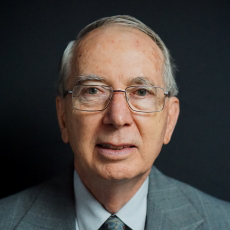
The Horn of Africa experienced a difficult 2021 and promises to endure an equally if not more challenging 2022. The civil war in Ethiopia currently involves less geography than it did a few months ago but is far from reaching a solution. Street protests continue in Sudan as the political crisis between the generals and civilian protesters worsens. Al-Shabaab remains a serious threat in Somalia as controversial parliamentary elections are again rescheduled. South Sudan faces one of the world’s most severe humanitarian crises, which shows signs of worsening.
All these conflicts could be ameliorated if there were agreement on solutions by the key international and regional actors. Unfortunately, this is not the case for any of the crises. Western countries, on the one hand, and China, Russia, and India, on the other, have different approaches to Ethiopia and Sudan. Key regional actors — Egypt, Turkey, Iran, and several of the Gulf states — are pursuing different policies on all of them. Eritrea has an outsized role in Ethiopia. Even Israel is something of a wild card in Sudan.
Ethiopia poses the biggest challenge for the United States. Neither the central government nor the rebel Tigrayan forces have demonstrated a willingness to end the military confrontation. The United States and the European Union will continue to push for a cease-fire and dialogue between the central government and Tigrayans. They will also urge unfettered humanitarian access to Tigray and an end to air strikes on civilian targets, and they are prepared to increase sanctions against all parties to the conflict. China, Russia, and India will continue to oppose sanctions and all three countries are more willing to accept the central government’s interpretation of events. Turkey, Iran, Saudi Arabia, and the UAE will continue to support the central government. Continuing conflict in Ethiopia offers an opening for Egypt to improve its bargaining position concerning the Grand Ethiopian Renaissance Dam (GERD) and may even result in support for the Tigrayan rebels. Eritrea, which sent troops into Tigray in support of the central government early in the conflict, will now pursue a low profile.
As differences increase between Sudan’s generals and civilian protesters, there is no prospect of ending the conflict. The military’s promise of elections in 2023 has fallen on deaf ears because it is not credible. In addition, the national military’s approach to the crisis is different than that of the allied Rapid Support Forces (RSF). The United States, which has had no ambassador in Khartoum since 1997, and its Western allies will continue to support the goals of the civilian protesters while China, Russia, and Egypt are aligned with the national military. The UAE and Saudi Arabia will remain close to both the national military and the RSF, which provided them troops in the Yemen conflict. Israel will continue to do what is required to ensure recognition by Sudan. The domestic political crisis will weaken Khartoum’s hand in countering Ethiopia on the GERD dispute.
Somalia’s prime minister has yet again rescheduled elections in the Lower House of Parliament, to be held by February 25, that will permit the selection of a new president. The fear is there will be another postponement, more tension between the prime minister and president, additional political instability in Somalia, greater opportunity for al-Shabaab to take advantage, and new reasons for several of the regional actors to interfere in Somali politics.
A third of South Sudan’s population is internally displaced and the 2018 peace agreement could be undermined by stalled implementation, risking a return to large-scale violence. The United States is the largest humanitarian donor, but its policy continues to be hindered by the lack of an ambassador. The major concern is that South Sudan will not receive adequate international attention because of a preoccupation with other crises in the Horn.
White House Statement on Biden/Abiy Phone Conversation
White House Statement on Biden/Abiy Phone Conversation
Source: The While House published on 10 January 2022 a statement on President Biden’s phone call with Prime Minister Abiy Ahmed concerning the conflict in Ethiopia.
The phone call dealt with peace and reconciliation in Ethiopia, the recent air strike in Tigray Region, humanitarian access across Ethiopia, human rights, a cease fire, and the strengthening of US-Ethiopian relations.
Labels: Abiy Ahmed, air strike, AU, cease fire, civil war, diplomacy, Ethiopia, human rights, humanitarian crisis, Joe Biden, political prisoners, US
Somalia is walking in Afghanistan’s footsteps
Somalia is walking in Afghanistan’s footsteps
The foreign-led nation-building experiment in Somalia will collapse, just like in Afghanistan, unless a different approach is taken.
- Source: Patrick GatharaCommunications consultant, writer, and award-winning political cartoonist based in Nairobi.
Published On 23 Aug 202123 Aug 2021

In his 2010 memoir Decision Points, former United States President George W Bush explained his rationale for the decision to invade Afghanistan in the following words:
“Afghanistan was the ultimate nation-building mission. We had liberated the country from a primitive dictatorship, and we had a moral obligation to leave behind something better. We also had a strategic interest in helping the Afghan people build a free society… because a democratic Afghanistan would be a hopeful alternative to the vision of the extremists.”
After two decades of Western occupation, however, there seems to be little sign of the “hopeful alternative” Bush predicted, at least judging from the desperate scenes at Kabul airport, where people have been scrambling to leave the country following the extraordinarily swift Taliban takeover of the country. This is despite the lives and treasure the West has poured into rebuilding Afghanistan’s institutions and economy, and into training and equipping the Afghan army and police.
There are important lessons to be drawn from Afghanistan’s fate by those engaged in the fight against extremist groups in Somalia where a similar nation-building experiment is being carried out by the African Union Mission to Somalia (AMISOM). For the past 14 years, African countries, with the support of the West, have deployed troops, drawn from Uganda, Burundi, Djibouti, Kenya and Ethiopia, to battle the al-Qaeda-affiliated terrorist group, al-Shabab, and to prop up Somalia’s feeble government. AMISOM also has civilian and police components aimed at helping rebuild civilian institutions.
Yet despite years-long efforts and the expenditure of some $900m annually, the government in Mogadishu remains weak and divided with little popular legitimacy. And though pushed out of most urban areas, the Islamist insurgency remains in control of much of the countryside and able to carry out devastating attacks in the capital at will.
Like Afghanistan, Somalia has seen some economic growth since al-Shabab was driven out of Mogadishu and many towns, with the World Bank estimating an annual GDP growth rate of 5-6 percent in 2015 and 2016. But the growth has mainly been urban-based, consumption-driven, and fuelled by donor support and remittances from the Somali diaspora.
Employment is concentrated in low-productivity agriculture with private sector development and diversification constrained by insecurity, political instability, weak institutions, inadequate infrastructure, widespread corruption and a difficult business environment. Last year, the country ranked at the very bottom of the 2020 Doing Business survey.
The similarities with Afghanistan do not end there. In December 2006, following an ill-advised declaration of holy war against Ethiopia, the Union of Islamic Courts was driven from power by a US-backed Ethiopian invasion, bringing to an end what some called a six-month “golden era” during which Somalia caught a fleeting glimpse of tranquility.
The UIC, a coalition of Islamic courts backed by the country’s business leaders, had previously kicked out the warlords notorious for indiscriminate violence and instituted a Taliban-like strict interpretation of Islamic law, banning music, cinema and sports, and pressuring women to wear veils. But they also brought some semblance of normality with fewer guns in the streets of Mogadishu and relatively free movement. The airport was reopened and basic needs were generally provided for.
However, this ended with the Ethiopian invasion, with the armed wing of the UIC morphing into the al-Shabab insurgency which, by the time the Ethiopian army withdrew in 2009, had swept across the country and restricted the internationally-backed Transitional Federal Government to a few blocks within the capital, protected by a few thousand Ugandan and Burundian troops.
In a recent op-ed for the Financial Times, Nigerian President Muhammadu Buhari stressed that the lesson for Africa from the Afghanistan debacle is that military force is not enough to defeat extremists or guarantee the transformation of societies. “Although sheer force can blunt terror,” he wrote, “its removal can cause the threat to return”.
He argued that what Africa needs in order to eliminate terror is “not swords but ploughshares”, economic partnerships that deliver real benefits, such as jobs, to the masses. “The boots we need on the ground are those of constructors, not the military.”
While there is profound truth in what he wrote, it is not the whole truth. Economic growth, even broad-based economic growth, and investments in building up the security infrastructure of troubled states may be necessary, but it is not sufficient. A fundamental component of what is lacking both in Afghanistan and Somalia is government legitimacy based on the population’s participation in government creation and decision-making and the ability to hold it accountable for its failures – in short, real democracy.
“The Taliban are inheriting a different country than they left 20 years ago,” US Congressman Jake Auchincloss, a Marine veteran who led patrols through Afghanistan, said in a recent interview. “The literacy rate has doubled, the infant mortality rate has halved, access to electricity has tripled or quadrupled, there are ten times as many kids in school as there were 20 years ago, 40 percent of whom are girls. The Taliban are inheriting a country in which real progress has been made.”
The question for Western policymakers should not just be whether, as Auchincloss asked, the Taliban will maintain this progress, but why, despite it, the country still fell.
The idea that populations can either be frightened into compliance by the prospect of a return to anarchy or their allegiance bought by economic growth and token participation in the form of voting in non-credible elections is the mainstay of international interventions which tend to appease, engage and empower corrupt elites, while doing little to deliver accountability. But this has been proven wrong in Afghanistan.
As detailed by former journalist Sarah Chayes in a scathing reflection on the US occupation, “Afghans could not be expected to take risks on behalf of a government that was as hostile to their interests as the Taliban were … For two decades, American leadership on the ground and in Washington proved unable to take in this simple message.” During that time “cronyism, rampant corruption, [and] a Ponzi scheme disguised as a banking system” flourished, she wrote.
The Faustian bargain which trades real investment in accountable institutions for pliable, properly Westernised individuals promising gains in security and the economy has a short shelf life. And when interventions install, tolerate and protect rulers who manipulate elections and build superficial regimes characterised by impunity, they entrench fragility rather than stability and become part of the problem rather than a vehicle for solutions.
That is the true lesson of Afghanistan. And it is one that those working to help Somalia should pay heed to.
The views expressed in this article are the author’s own and do not necessarily reflect Al Jazeera’s editorial stance.
- Patrick GatharaCommunications consultant, writer, and award-winning political cartoonist based in Nairobi.
Somali president orders central bank governor not to release $9.6M in ‘illicit’ UAE money
Somali president orders central bank governor not to release $9.6M in ‘illicit’ UAE money

Source: AA, Saturday January 8, 2022
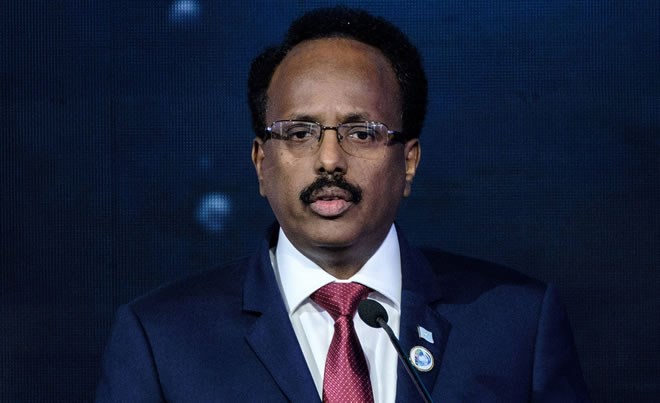
Somali President Mohamed Abdullahi Mohamed ordered the central bank governor not to release nearly $10 million in “illicit” money Friday that was seized from the United Arab Emirates (UAE) in 2018 at Adan Adde International Airport in Mogadishu.
“H.E @M_Farmaajo President of the Federal Republic of Somalia, orders Governor of the Central Bank @CBSsomalia against releasing illicit money, 9.6M USD which was seized by our gallant Somali Security forces to any entity which seeks claim, due to its illegal entry into our nation,” the presidential palace Communications Director Abdirashid Mohamed Hashi said on Twitter.
It came hours after Prime Minister Mohamed Hussein Roble publicly apologized to the UAE for the seizure and announced his government will give the money back.
“A new dawn of normalizing relations. After a period of cold relations, Somalia & UAE are now on a progressive path to solve their differences & resume the brotherly ties between the 2 countries. PM Mohamed Hussien Roble tells that Somalia will give back to UAE the seized cash in 2018,” said government spokesman Mohamed Ibrahim Moalimuu.
That announcement comes after Roble received 55 tons of aid from the UAE at the Mogadishu airport.
The money has been at the central bank and it led Somalia’s diplomatic relations with the Gulf country to further deteriorate.
The UAE closed a military facility and a hospital in Mogadishu after the diplomatic dispute.
Somalia accused the UAE several times of instigating chaos in the African country.
In March 2018, the lower house of Somalia’s parliament banned a UAE state-owned ports operator, DP World, from the Horn of Africa country, declaring it a threat to Somalia’s sovereignty, independence and unity.
India, Somalia and Madagascar may become one continent in 200 million years: Study
India, Somalia and Madagascar may become one continent in 200 million years: Study

Source: The Indian Express, Saturday January 8, 2022
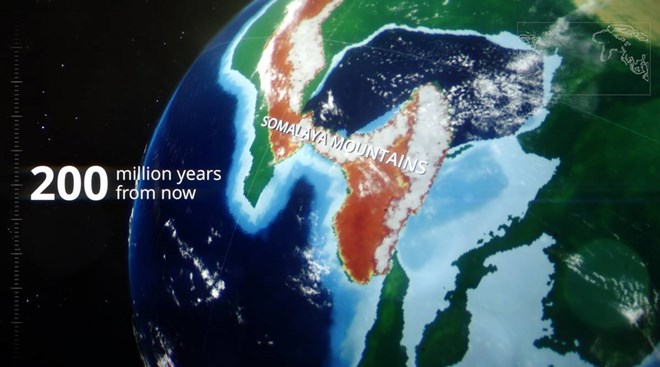
A study published recently in the American Journal of Science shows that east Africa (including modern Somalia, Kenya, Tanzania, and Mozambique), and Madagascar, will override India in about 200 million years.
This will also lead to the ‘formation of a long mountain range along the modern west coast of India’ which the team named ‘Somalaya’.
Speaking to indianexpress.com, Utrecht University geologist Prof. Douwe van Hinsbergen, who led the team, said ‘we now have the answer as to how the mountains and continents of the future will look like.
“I had made reconstructions of the past – of a continent that disappeared in the Mediterranean region, another major continent that disappeared in Southeast Asia whose relics we find all over Indonesia. But I had never made any future simulations. But the question caught my attention and I discussed it with my student and after about two years we now have an answer,” said Dr. van Hinsbergen.
The research team noted that Seychelles and Mauritius islands will all be pushed up and Mumbai will lie at the foot of the Somalaya range, as New Delhi lies at the foot of the Himalayas today.
“You will get a depression in southwest India, from Trivandrum all the way to Karachi. And the Horn of Africa which includes Somalia will override or bulldoze over southwest India and make this big mountain belt,” explained Dr. van Hinsbergen.
How did they arrive at this conclusion?
Thomas Schouten, a PhD student at ETH Zürich, in Switzerland, and one of the authors explained: “We have so many studies that have reconstructed the past, for which we have knowledge on how tectonic plates moved – how fast, which way they went etc. In our study, we assumed that the rift that goes through the African continent and underlies the east African lakes will continue to split the two parts of Africa and an ocean will be formed in the next 200 million years.”
He added that when this space is created in Africa, we must remove space in the Indian Ocean. “So basically the beaches of Malabar will be scooped up like a bulldozer, and coral reefs, beaches, and low lying areas will fold up to become high peaks. Seychelles will also get placed next to the Lakshadweep and along with the Malabar sediments they may become a mountain range of eight kilometers high, similar to the Himalayas where we find old coral reefs at the tops of mountains like Everest,” explains Schouten.
Why break Africa?
The team explained that the fault lines along which two ancient continents collided in the past remain weak. “So, modern continents like Africa can break along those old fault lines. And it’s a similar thing to how India broke off from Madagascar, 90 million years ago,” explains Dr. van Hinsbergen “The most important thing to remember is, continents do not exist forever. India has existed as we know it today only for the last few tens of million years. Before that, it was an island. The Indian Ocean will surely close one day. And then there will be a continent hitting India. And it’s either Africa or Antarctica, or it might be Australia.”
In the construction of the future, the team looked at Africa. They added that they ignored Southeast Asia, which will likely collide with east India. “India may sometime in the future even look like Mongolia – situated right in the middle of an enormous supercontinent surrounded by high mountain ranges of which the Somalaya may be one,” said Dr. van Hinsbergen.
The team said that the main goal was to think through which features of the modern Indian Ocean will be preserved in mountain belts, and which may not. This helps to better reconstruct the history of the Earth’s plates and surfaces of the geological past, which is important to help understand the evolution of climate, life, and resources.
In the construction of the future, the team looked at Africa. They added that they ignored Southeast Asia, which will likely collide with east India. “India may sometime in the future even look like Mongolia – situated right in the middle of an enormous supercontinent surrounded by high mountain ranges of which the Somalaya may be one,” said Dr. van Hinsbergen.
The team said that the main goal was to think through which features of the modern Indian Ocean will be preserved in mountain belts, and which may not.
This helps to better reconstruct the history of the Earth’s plates and surfaces of the geological past, which is important to help understand the evolution of climate, life, and resources.
Ethiopia releases political prisoners as PM calls for reconciliation
Ethiopia releases political prisoners as PM calls for reconciliation

Source: Hiiraan Online, Saturday January 8, 2022
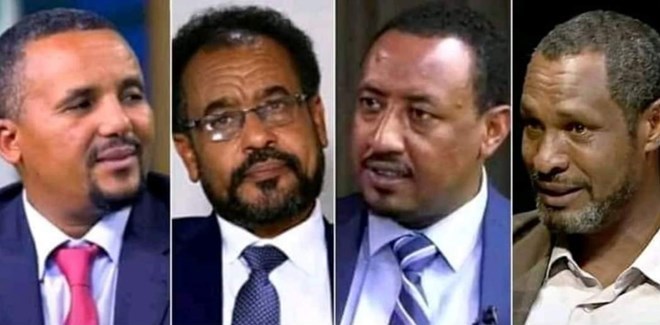
ADDIS ABABA(HOL) – The Ethiopian government has released political prisoners among them media mogul and Oromo firebrand politician Jawar Mohamed following charges of terrorism in 2020.
advertisements
The release of the political prisoners, the government said was done for the ‘improvement of the political situation.’
The move follows calls by Prime Minister Abiy Ahmed for reconciliation amid an ongoing war that has now lasted for over a year.
“The government has granted amnesty to the prisoners to make the national dialogue a success and hoping that they will make a better contribution to the country and to the people,” the state control media reported.
advertisementsMohamed, alongside several Oromo leaders, were arrested in June 2020 following the killing of popular musician Hachalu Hundesa whose death galvanised mass protests precipitating a political turmoil that has persisted to death.
Among those released include Sebhat Nega, Eskinder Nega, Kidusan Nega, Abay Woldu, Abadi Zemu, Mulu Gebre Egziabher and Kiros Hagos
US and Europe Warn Sudan’s Military
US and Europe Warn Sudan’s Military
Source: ABC News published on 5 January 2022 an article titled “US, Europe Warn Sudan’s Military as Democratic Transition Unravels” by Conor Finnegan and Morgan Winsor.
As street protests continue in Sudan, the United States and Europe are taking a strong stand against efforts by the military to thwart the democratic transition.
Labels: Abdalla Hamdok, counterterrorism, David Satterfield, democracy, Egypt, EU, military, Norway, Saudi Arabia, Sudan, UAE, UK, UN, US
PM demands control of military until conclusion of election
PM demands control of military until conclusion of election

Source: Hiiraan Online, Thursday January 6, 2022
PM demands control of military until conclusion of elections
Mogadishu (HOL) – The National Consultative Assembly leaders are reportedly at odds over who should be in charge of Somalia’s security, according to sources.
The PM and the presidents of Somalia’s federal member states met for the fourth day in Mogadishu to discuss improving the electoral process and concluding the elections on a reliable timeline.
advertisements
Prime Minister Roble has reportedly pushed for more direct control of Somalia’s security apparatus, requesting that the national army be placed under his command during the remainder of the electoral process.
According to sources, Roble argued that it would be challenging to resolve electoral security as long as military commanders took orders from Villa Somalia.
Relations between the PM and President have been strained considerably since Farmajo attempted to suspend Roble in late December over unfounded corruption allegations. The move has appeared to fail, as Somalia’s cabinet and the international community rallied behind the PM.
The reaction by FMS leaders was divided as some regional presidents – Deni of Puntland and Madobe of Kismayo – have reportedly backed the PM’s plan, while the remaining three state presidents, Qoorqoor of Galmudug, Gudlawe of Hirshabelle, Lafta-gareen of South West State and the Banadir governor, Omar Filish – all of whom have strong ties with Villa Somalia – have firmly rejected it, arguing that President Farmajo is the commander of the armed forces and responsible for the country’s security.
This PM’s security demands have hampered the conference’s progress, and reports suggest that some presidents have threatened to walk out of the meeting, which could lead to the highly anticipated meeting ending in failure.
The meeting ended inconclusively with the leaders scheduling to resume the conference on Saturday.
International community urges Somali leaders to ensure credible elections
International community urges Somali leaders to ensure credible elections

Source: Hiiraan Online, Wednesday January 5, 2022
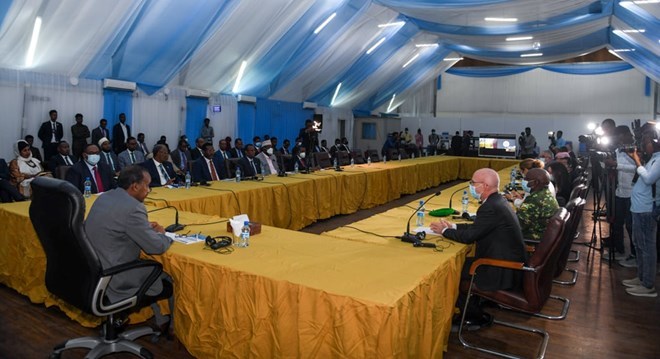
Mogadishu (HOL) The international community has called on the Somali National Consultative Assembly to ensure that the country’s Somalia holds credible elections in a timely manner.
The call came after diplomats met with Somalia’s prime minister and regional presidents in Mogadishu on Tuesday.
advertisements
“International partners urge the National Consultative Assembly to ensure that the elections are credible so that Somalia can focus on other priorities such as security and development,” United Nations special envoy to Somalia James Swan said in a statement.
Swan said the UN encourages better implementation of the electoral process, including correcting irregularities in the rules and ensuring a clear deadline to complete credible elections.
Representatives of the international community led by the UN head in Somalia James Swan joined in for the second day of the National Consultative Council meeting today amid expectations of a way forward to conclude the long-running elections in the country. Prime Minister Mohamed Roble and Presidents of the Federal Member States started the meeting yesterday following recent skirmishes between the PM and outgoing President Mohamed Farmaajo.
The meeting is expected to further deliberate on ironing out contentious issues in the elections, including transparency, number of polling stations, security and ways to expedite the process. The first senator was elected on 29 July 2021, and to date, less than half of the Lower House seats have been filled.
The National Consultative Council continues to meet in Mogadishu for the third day to discuss ways to overcome the political stalemate hampering the elections.
US Removes Ethiopia, Mali, and Guinea from Africa Growth and Opportunity Act
US Removes Ethiopia, Mali, and Guinea from Africa Growth and Opportunity Act
Source: Aljazeera published on 2 January 2022 an article titled “US Removes Ethiopia, Mali and Guinea from AGOA Trade Programme.”
The United States removed Ethiopia on 1 January 2022 from AGOA eligibility due to “gross violations of internationally recognized human rights being perpetrated by the government of Ethiopia and other parties amid the widening conflict in northern Ethiopia.” It removed Mali and Guinea because of coups d’etat in both countries. Each country has benchmarks for reinstatement of AGOA eligibility.
A factsheet on “AGOA and Ethiopia” explains that in 2020 Ethiopia exported to the United States $238 million of goods (mostly apparel and footwear) under the terms of the Africa Growth and Opportunity Act. Coffee exports of $131 million did not fall under AGOA.
Labels: AGOA, coffee, coup d’etat, Ethiopia, footwear, Guinea, human rights, Mali, textiles, trade, US
Somali Election Dispute Risks Political Violence
Somali Election Dispute Risks Political Violence
Source: The Washington Post published on 27 December 2021 an article titled “Somalia’s Election Standoff Intensifies, Raising Risk of Political Violence” by Sakariye Cismaan and Max Bearak.
The U.S. State Department issued a statement on 26 December 2021 expressing deep concern at the continuing delays and procedural irregularities that have undermined the credibility of the electoral process.
The decision by Somalia’s president to suspend the powers of his prime minister is postponing the electoral process and exacerbating the constitutional conflict. It increases the possibility of political violence in a country that is already threatened by the al-Shabaab terrorist group.
Labels: al-Shabaab, elections, governance, Mohamed Abdullahi Farmajo, Mohamed Hussein Roble, Somalia, US
Sudan’s Darfur Headed Backwards
Sudan’s Darfur Headed Backwards
Source: Foreign Policy posted on 30 December 2021 a commentary titled “How to Stop Darfur’s Descent into Darkness” by Volker Perthes, UN special representative for Sudan.
More than 400,000 people have been displaced in Darfur this year and there has been a sharp increase in sexual violence. The UN peacekeeping mission has ended and been replaced by a smaller political mission. The UN effort needs more support if it is to maintain peace.
Labels: CAR, Chad, climate change, Darfur, IDPs, Libya, peacekeeping, Rapid Support Forces, sexual violence, South Sudan, Sudan, UNAMID
African Union chair calls for restraint, dialogue between Somali PM and presiden
Source: African Union chair calls for restraint, dialogue between Somali PM and president

Saturday January 1, 2022
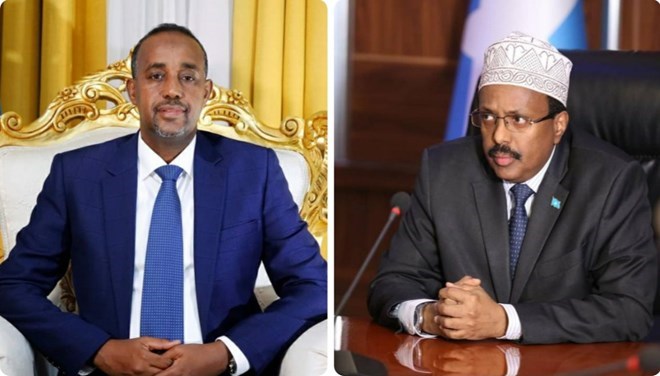
Chairperson of the African Union Commission Moussa Faki Mahamat has issued a statement calling for the “utmost restraint” and “continued engagement” between Somalia’s prime minister and the country’s president, amid a deepening political crisis that has sparked widespread international alarm.
In recent days, heavily armed factions loyal to either party could be seen patrolling parts of the capital Mogadishu, raising fears that the tensions could erupt into violence.advertisements
On Tuesday, soldiers loyal to Prime Minister Mohamed Hussein Roble took up positions near the presidential palace a day after President Mohamed Abdullahi Mohamed, better known as Farmajo, announced the suspension of the premier, who accused him of an “attempted coup”.
Relations between the pair have long been frosty, but the latest developments have sparked concerns for Somalia’s stability as the country struggles to hold long-delayed elections and fight a jihadist insurgency.
Faki said the African Union remained committed to scaling up its support for durable peace and political stability in Somalia.
Sudan’s Revolution Leads to Despair
Sudan’s Revolution Leads to Despair
Source: The Washington Post published on 20 December 2021 an article titled “Three Years into Sudan’s ‘Endless Revolution,’ Hope Slides Towards Despair” by Max Bearak.
The article offers the view that forces for democracy and civilian government in Sudan, although still active and numerous, are being worn down by the military’s unwillingness to give up its power and control over key economic enterprises.
Labels: Abdalla Hamdok, democracy, Egypt, Forces for Freedom and Change, protesters, revolution, Sudan
Chance for Peace in Ethiopia
Chance for Peace in Ethiopia?
Source: The International Crisis Group (ICG) published on 23 December 2021 a statement titled “A Rare Chance for Peace in Ethiopia.”
The ICG argues the Tigray Defense Force withdrawal from Amhara and Afar regions provides an opening for peace, which the central government should exploit.
Labels: Abiy Ahmed, Afar Region, Amhara Region, AU, cease fire, civil war, Debretsion Gebremichael, ENDF, Eritrea, national dialogue, Tigray Defense Forces, Tigray Region, TPLF
Egyptian Fears of the Grand Ethiopian Renaissance Dam
Egyptian Fears of the Grand Ethiopian Renaissance Dam
Source: The Globe and Mail published on 3 December 2021 a major article titled “Fear along the Nile: Why Egypt Sees a Massive Dam in Ethiopia as a Matter of Life and Death” by Eric Reguly.
This is an up to date look at the impact of the Grand Ethiopian Renaissance Dam from the Egyptian perspective. It is richly illustrated with photographs and maps.
Labels: agriculture, climate change, drought, Egypt, Ethiopia, food security, GERD, irrigation, Nile waters, Sudan, Trump administration
Putting the Horn of Africa Back Together
Putting the Horn of Africa Back Together
Source: The International Crisis Group posted on 23 December 2021 a 36-minute podcast titled “Putting the Horn of Africa Back Together” with Charles Onyango-Obbo, Ugandan journalist, Betty Kaari Murungi, Kenyan lawyer, and Harry Verhoeven, Columbia University.
The podcast asks if there is any way to reverse the political fragmentation in the Horn of Africa and to build a lasting order that can stem continuing conflict. The Intergovernmental Authority on Development seems to be totally ineffective in the current situation, and there is no indication that it can step forward to solve these security issues.
Labels: AU, democracy, Djibouti, elections, Eritrea, Ethiopia, GERD, Gulf States, Horn of Africa, IGAD, Kenya, nationalism, security, Somalia, South Sudan, Sudan, Uganda
4.6 million at risk for severe food insecurity in Somalia: UNICEF
4.6 million at risk for severe food insecurity in Somalia: UNICEF

Source: AA, Sunday December 26, 2021
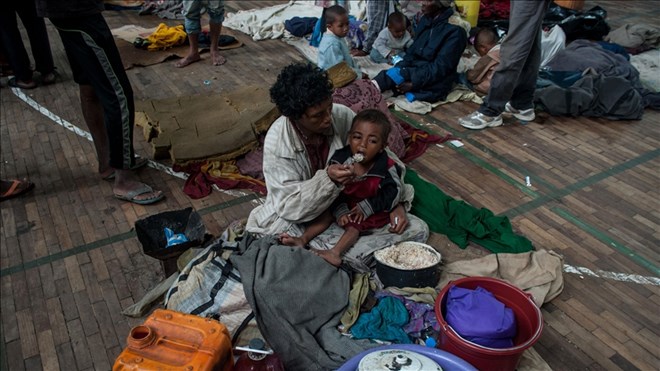
Three consecutive dry seasons has left an estimated 3.8 million people in Somalia at risk of severe food insecurity through January, UNICEF said Thursday.
And that figures will increase to 4.6 million by May.
advertisements
“Severe water shortages and rising food prices have left Somalia as the Horn of Africa’s most severely drought-affected country,” the UN said in a statement. “UNICEF’s Humanitarian Action for Children (HAC) appeal funding gap remains at 35 percent from the required $124 million.”
A total of 831,296 people — 242, 622 girls, 271,586 boys, 163,090 women, and 153, 998 men — received UN emergency water supplies through its water trucking and water point rehabilitation in Somalia in 2021, according to the statement.
The UN agency said it provided psychosocial support for 64,818 children and caregivers, with 66% being children.
Somalia declared a state of humanitarian emergency as the country faces its worst drought in decades.
The worst-affected regions for the drought and water shortages include Gedo, Bay, Bakol, Lower Jubba, Galgadud, Mudug, and parts of Bari, Nugaal, Sool, Sanaag, Togdheer, and Hiraan. About 2.6 million people are facing water shortages.
More than 2 million in 66 districts are in acute need and will require immediate lifesaving water, sanitation, and hygiene services for the next six months, the UN previously warned.
Among the most at risk are 1.7 million children and women who are exposed to protection risks due to limited water resources.
Somalia’s drought, the worst in decades, has already claimed 13 lives, according to local officials.
The drought is compounding severe vulnerabilities and humanitarian needs caused by decades of protracted conflict and insecurity, climate shocks, and disease outbreaks.


